SSRI’M OK
Join Dr. Bijan Zarrabi, a resident psychiatry doctor at Harvard Medical School, and Macey Isaacs, a stand-up comedian, as they conduct insightful interviews with experts in the field of psychiatry. With the help of comedians, they navigate discussions on topics such as depression, anxiety, ADHD, and more, aiming to debunk misinformation and demystify mental health. Their goal is to destigmatize these issues through a blend of expertise and humor, making listeners feel understood and supported. After listening, you’ll hopefully realize, “Wow, SSRI’m OK.” *Serious side effects may include laughter. In rare cases, healing may occur.
Episodes
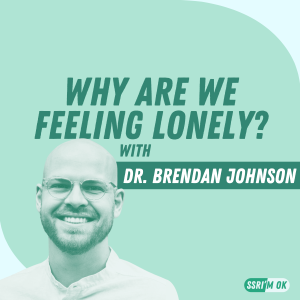
Tuesday Jul 23, 2024
Tuesday Jul 23, 2024
In this episode of "SSRI’M OK," hosts Dr. Bijan Zarrabi, a psychiatry resident doctor, and Macey Isaacs, a stand-up comedian, are joined by the perceptive Dr. Brendan Johnson. Dr. Johnson was a Visiting Research Scholar at Blackfriars Hall, Oxford, where he conducted research on 'the mental commons' and its enclosure as a paradigm for explaining worsening mental health in society at large. He is the co-host of the “Social Medicine On Air” podcast.
In this thought-provoking episode, we explore how the structures and pressures of capitalism contribute to widespread unhappiness and anxiety. Dr. Johnson explains why people are more unhappy and anxious than ever before, delving into the societal factors driving these troubling trends. We discuss the increase in deaths of despair and the pervasive feelings of loneliness affecting many individuals today.
Central to our discussion is the concept of the "mental commons" and how it is being stolen, leading to negative impacts on mental health. Dr. Johnson emphasizes how climate change contributes to anxiety and a sense of hopelessness about the future, framing it as a thief of our collective future. We also touch on the critical role of social determinants in shaping mental health outcomes and provide practical advice and strategies to help individuals feel less isolated and more connected.
Additionally, we delve into the history of the enclosure of the commons and its relevance to today's mental health landscape. The importance of finding a "third place" outside of home and work to foster a sense of community and belonging is discussed, along with why traditional psychiatric answers often fall short in addressing the deeper "why" behind mental health issues.
Tune in to gain a deeper understanding of the intersection between society and mental health, and learn how we can work towards a more holistic approach to mental well-being.
Resources Mentioned:
https://www.hhs.gov/about/news/2023/05/23/surgeon-general-issues-new-advisory-about-effects-social-media-use-has-youth-mental-health.html
https://www.hhs.gov/about/news/2023/05/03/new-surgeon-general-advisory-raises-alarm-about-devastating-impact-epidemic-loneliness-isolation-united-states.html
Bo Burnham’s interview about social media
Case A, Deaton A. Deaths of Despair and the Future of Capitalism. Princeton UP; 2020.
Fairlie S. A Short History of Enclosure in Britain. The Land. 2009;(7).
Hardt M, Negri A. Commonwealth. Belknap; 2009.
Seo H. America Is Getting Lonelier and More Indoorsy. That’s Not a Coincidence. The Atlantic. 2023.
Smith AB, Johnson CD. Private Equity Ownership in Health Care Linked to Higher Costs, Worse Quality. JAMA. 2023;320(24):2567-2569.
Wu T. The Attention Merchants: The Epic Scramble to Get inside Our Heads. Knopf; 2016.
“Deep Work” by Cal Newport
“Bowling Alone” by Robert Putnam
“Commonwealth” by Michael Hardt
“Social Medicine on Air” podcast
Go to PureYogaTexas.com/pure-yogatv to become a member today!
Art by Zoe Zakson.
Music is “As I Figure” by Kevin MacLeod.
Check out our website: ssrimokpod.com
Follow us on IG or X @ssrimokpod
Contact us: ssrimokpod@gmail.com
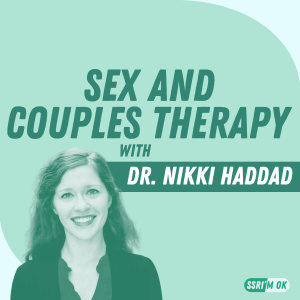
Tuesday Jul 09, 2024
Tuesday Jul 09, 2024
In this episode of "SSRI’M OK," hosts Dr. Bijan Zarrabi, a psychiatry resident doctor, and Macey Isaacs, a stand-up comedian, are joined by the insightful Dr. Nikki Haddad. Dr. Haddad's clinical interests and expertise encompass women's mental health, trauma, and couples and sex therapy.
Join us as we dive deep into Dr. Haddad's journey and discover what inspired her to specialize in couples therapy. We explore the transformative benefits of couples therapy, including how it can strengthen relationships, improve communication, and foster a deeper emotional connection between partners. Dr. Haddad shares valuable insights and practical tips that can help couples navigate their challenges and enhance their relationships.
In this episode, you'll also learn about Dr. Zarrabi's love language, and how money can be more intimate than sex. We discuss the history of psychiatry's approach to sex, and Dr. Haddad's perspective on viewing sex from a pleasure lens rather than a pathological one. The conversation delves into the difference between arousal and desire, understanding sexual trauma, and Low Libido Disorder. We also address SSRI-induced sexual dysfunction, common misconceptions about sex, and the concept that all sex is queer sex.
Whether you're in a relationship or interested in the intricacies of mental health and therapy, this episode offers a wealth of knowledge and engaging conversation.
Tune in to gain a better understanding of the crucial role of couples therapy in promoting emotional well-being and maintaining healthy, fulfilling relationships.
Resources Mentioned:
Couples Therapy on Showtime
Where Should We Begin book (and podcast) by Esther Perel
Masters of Sex on Showtime
Come as You Are by Emily Nagoski
Attached by Amir Levine
Baby Reindeer on Netflix
Sari M. van Anders’ study on The Heteronormativity Theory of Low Sexual Desire in Women Partnered with Men
Sexvangelicals podcast
Nikki Glaser’s Someday You’ll Die special on HBO
Go to PureYogaTexas.com/pure-yogatv to become a member today!
Art by Zoe Zakson.
Music is “As I Figure” by Kevin MacLeod.
Check out our website: ssrimokpod.com
Follow us on IG or X @ssrimokpod
Contact us: ssrimokpod@gmail.com
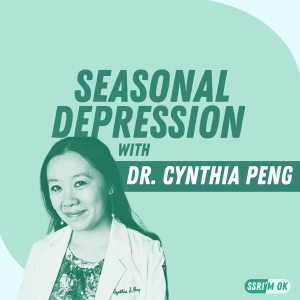
Tuesday Jun 25, 2024
Tuesday Jun 25, 2024
In this episode of "SSRI’M OK," hosts Macey Isaacs, a stand-up comedian, and Dr. Bijan Zarrabi, a psychiatry resident doctor, are joined by Dr. Cynthia Peng. Dr. Peng, who treats patients with psychiatric conditions in the inpatient, consult, and outpatient settings, will discuss Major Depressive Disorder with a Seasonal Pattern, also known as Seasonal Affective Disorder. It’s getting warmer and MDD with a Seasonal Pattern is not limited to the winter! Do you have that summertime sadness? She will define the disorder, explain how it can be diagnosed, and delve into its history and possible causes. Tune in to learn tips on combating Seasonal Affective Disorder while enjoying some laughs along the way.
Resources Mentioned:
Macey’s Yacht Rock Playlist on Spotify
Go to PureYogaTexas.com/pure-yogatv to become a member today!
Art by Zoe Zakson.
Music is “As I Figure” by Kevin MacLeod.
Check out our website: ssrimokpod.com
Follow us on IG or X @ssrimokpod
Contact us: ssrimokpod@gmail.com
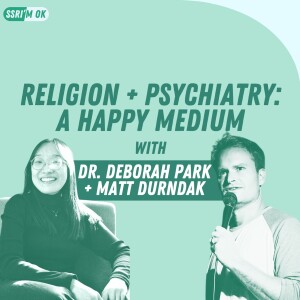
Monday Jun 10, 2024
Monday Jun 10, 2024
In this episode of "SSRI’M OK," hosts Macey, a stand-up comedian, and Dr. Bijan Zarrabi, a psychiatry resident doctor, bring a unique blend of humor and mental health insights. They are joined by Dr. Deborah Park, a resident psychiatrist at Brigham and Women’s Hospital, to explore the intersection of religion, psychiatry, and happiness. Later, they are joined by comedian Matt Durndak to present the side of a skeptic. The conversation touches on belief, unbelief, locus of control, and more.
Resources Mentioned:
“Build the Life You Want” by Arthur Brooks and Oprah Winfrey
Maria Bamford is Down to Join Your Cult on NPR
“The Wounded Healer” by Henri J. Nouwen
Go to PureYogaTV.com to become a member today!
Art by Zoe Zakson.
Music is “As I Figure” by Kevin MacLeod.
Check out our website: ssrimokpod.com
Follow us on IG or X @ssrimokpod
Contact us: ssrimokpod@gmail.com

Tuesday May 28, 2024
Tuesday May 28, 2024
In this episode of "SSRI’M OK," hosts Macey, a stand-up comedian, and Dr. Bijan Zarrabi, a psychiatry resident doctor, bring a unique blend of humor and mental health insights. They are joined by Dr. Montie Meyer, staff psychiatrist at Brigham and Women’s Hospital, to delve even deeper into the world of SSRIs (Selective Serotonin Reuptake Inhibitors). The conversation touches on the science behind SSRIs, their effects, and common misconceptions, providing listeners with both educational content and lighthearted moments.
Resources Mentioned:
Moncrieff, J., Cooper, R. E., Stockmann, T., Amendola, S., Hengartner, M. P., & Horowitz, M. A. (2023). The serotonin theory of depression: a systematic umbrella review of the evidence. Molecular psychiatry, 28(8), 3243-3256.
Go to PureYogaTV.com to become a member today!
Art by Zoe Zakson.
Music is “As I Figure” by Kevin MacLeod.
Follow us on social media: @ssrimokpod
Contact us: ssrimokpod@gmail.com
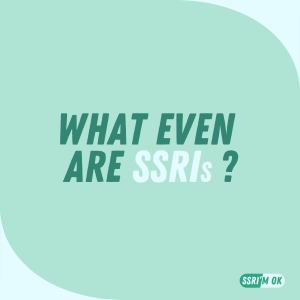
Tuesday May 14, 2024
Tuesday May 14, 2024
In this episode, we briefly discuss what a selective serotonin reuptake inhibitor (SSRI) is since the name of our podcast is “SSRI’M OK” and some people don’t understand the reference and that’s okay. That’s what we get for trying to be creative. We also briefly discuss the history of the discovery of some antidepressant medications like SSRIs and monoamine oxidase inhibitors (MAOIs.)
Key Points:
Your brain is made of cells. The two main types of cells in the brain are neurons, and glial cells, also known as neuroglia.
Neurons communicate with each other using neurotransmitters like serotonin, norepinephrine, and dopamine.
The space between the neurons where neurotransmitters are released is called the synapse.
The neuron (let’s call it neuron A) that drops off neurotransmitters to another neuron (neuron B) has reuptake channels that take back the neurotransmitters that neuron A released. The reuptake channels are named after the specific neurotransmitter they reuptake (serotonin reuptake transporters reuptake serotonin, norepinephrine reuptake transporters reuptake norepinephrine, etc.)
SSRI are “selective serotonin reuptake inhibitors,” meaning they block the reuptake transporters for serotonin. This leaves more serotonin in the synapse which can lead to downstream changes that are theorized to help treat depression.
The discovery of antidepressant medications and the belief that “low serotonin leads to depression” was started when studying an anti-tuberculosis medication called “Isoniazid.”
While investigating different formulations of isoniazid, they developed a similar medication called Iproniazid which is slightly different to Isoniazid molecularly.
When they were giving Iproniazid to patients in their research trials, they found that anyone who got the drug, regardless of whether or not they had tuberculosis, had “mood elevating” effects. Patients showed improved sleep, sociability, and appetite. A psychiatrist, Max Lurie, coined the term “antidepressant” in reference to the mood effects that iproniazid had on people. [1]
It turned out that Iiproniazid stops the activity of an enzyme in our brains that breaks down specific neurotransmitters like serotonin, dopamine, and norepinephrine. The enzyme is called MAO, short for monoamine oxidase.
The pharmaceutical company Eli Lilly began developing molecules that would selectively inhibit the reuptake of serotonin at serotonin transporters to increase serotonin in the synapse, which led to the first report on an SSRI called fluoxetine being published [2].
Fluoxetine was approved by the FDA in December of 1987 and was launched to the market in January 1988 under the trade name Prozac.
SSRI examples: Prozac (fluoxetine), Zoloft (sertraline), Celexa (citalopram), Lexapro (escitalopram), Luvox (fluvoxamine), Paxil (paroxetine)Brand names capitalize, generic names are in parentheses. They are the same medications.
Some SSRIs don’t selectively bind to the serotonin reuptake transporter. For example, fluoxetine also binds to the norepinephrine reuptake transporter. It is sometimes referred to as an “activating” SSRI because norepinephrine is a neurotransmitter linked to alertness and arousal. However, the clinical relevance of this norepinephrine effect is not clear. Fluoxetine is an antagonist at 5HT2C receptors; this has been proposed as a potential mechanism for its activating properties. [3]
Resources Mentioned:
Van Der Walt, M., & Keddy, K. H. (2021). The Tuberculosis-Depression Syndemic and Evolution of Pharmaceutical Therapeutics: From Ancient Times to the Future. Frontiers in psychiatry, 12, 617751. https://doi.org/10.3389/fpsyt.2021.617751
Wong, D. T., Horng, J. S., Bymaster, F. P., Hauser, K. L., & Molloy, B. B. (1974). A selective inhibitor of serotonin uptake: Lilly 110140, 3-(p-trifluoromethylphenoxy)-N-methyl-3-phenylpropylamine. Life sciences, 15(3), 471–479. https://doi.org/10.1016/0024-3205(74)90345-2
Ni, Y. G., & Miledi, R. (1997). Blockage of 5HT2C serotonin receptors by fluoxetine (Prozac). Proceedings of the National Academy of Sciences, 94(5), 2036-2040.
Also mentioned in today’s episode is “The Body Keeps the Score” by Bessel van der Kolk.
Go to PureYogaTV.com to become a member today!
Art by Zoe Zakson.
Music is “As I Figure” by Kevin MacLeod.
Contact us: ssrimokpod@gmail.com








